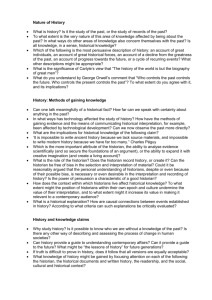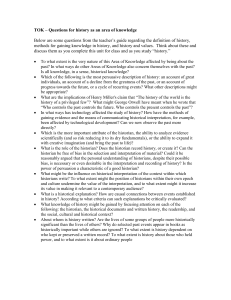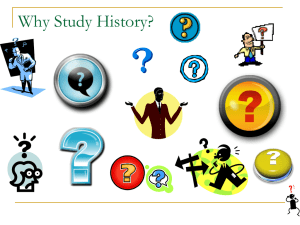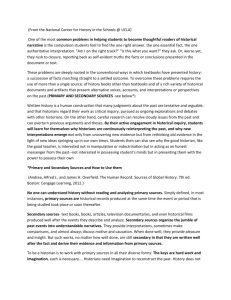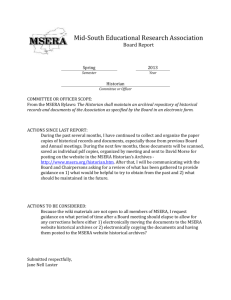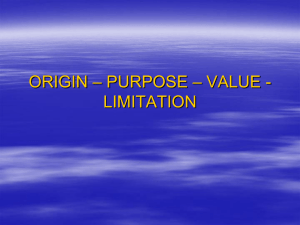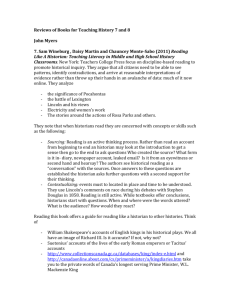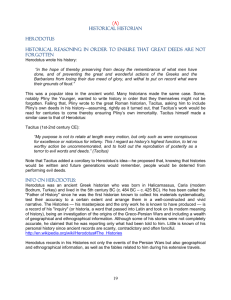Chapter 1 Some Thoughts about History 1.1. Uses of history 1.2
advertisement
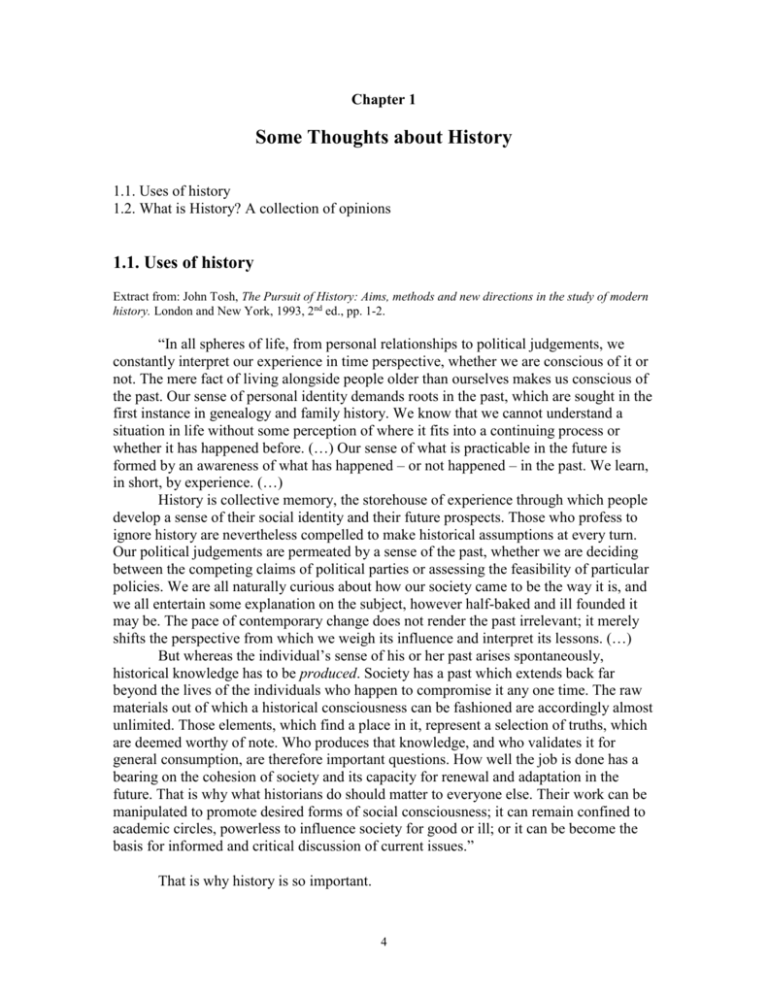
Chapter 1 Some Thoughts about History 1.1. Uses of history 1.2. What is History? A collection of opinions 1.1. Uses of history Extract from: John Tosh, The Pursuit of History: Aims, methods and new directions in the study of modern history. London and New York, 1993, 2nd ed., pp. 1-2. “In all spheres of life, from personal relationships to political judgements, we constantly interpret our experience in time perspective, whether we are conscious of it or not. The mere fact of living alongside people older than ourselves makes us conscious of the past. Our sense of personal identity demands roots in the past, which are sought in the first instance in genealogy and family history. We know that we cannot understand a situation in life without some perception of where it fits into a continuing process or whether it has happened before. (…) Our sense of what is practicable in the future is formed by an awareness of what has happened – or not happened – in the past. We learn, in short, by experience. (…) History is collective memory, the storehouse of experience through which people develop a sense of their social identity and their future prospects. Those who profess to ignore history are nevertheless compelled to make historical assumptions at every turn. Our political judgements are permeated by a sense of the past, whether we are deciding between the competing claims of political parties or assessing the feasibility of particular policies. We are all naturally curious about how our society came to be the way it is, and we all entertain some explanation on the subject, however half-baked and ill founded it may be. The pace of contemporary change does not render the past irrelevant; it merely shifts the perspective from which we weigh its influence and interpret its lessons. (…) But whereas the individual’s sense of his or her past arises spontaneously, historical knowledge has to be produced. Society has a past which extends back far beyond the lives of the individuals who happen to compromise it any one time. The raw materials out of which a historical consciousness can be fashioned are accordingly almost unlimited. Those elements, which find a place in it, represent a selection of truths, which are deemed worthy of note. Who produces that knowledge, and who validates it for general consumption, are therefore important questions. How well the job is done has a bearing on the cohesion of society and its capacity for renewal and adaptation in the future. That is why what historians do should matter to everyone else. Their work can be manipulated to promote desired forms of social consciousness; it can remain confined to academic circles, powerless to influence society for good or ill; or it can be become the basis for informed and critical discussion of current issues.” That is why history is so important. 4 1.2. What is History? A collection of opinions “History is a pack of lies.” William Stubbs (1825-1901) “I often think it odd that it should be so dull, for a great deal of it must be invention.” Jane Austin (Catherine Morland commenting about history in Northanger Abbey) “History, a distillation of rumour” Thomas Carlyle (1795-1881) “What is history but a fable agreed upon” Napoleon Bonaparte (1769-1821) “History is a combination of reality and lies. The reality of History becomes a lie. The unreality of fable becomes the truth.” (L'Histoire est un alliage de reel et la mensonge. Le reel de l’Histoire devient un mensonge. L’irreel de la fable devient verite.) Jean Cocteau (1889-1963) “Instead of being equally shared between its two rulers, the Reason and the Imagination, [History] falls alternately under the sole and absolute dominion of each. It is sometimes fiction. It is sometimes theory.” Lord Macaulay (1800-1859) “History . . . An account, mostly false, of events, mostly unimportant, which are brought about by rulers, mostly knaves, and soldiers, mostly fools.” Ambrose Bierce (1842-1914) “That great dust-heap called ‘history’.” Augustine Birrell (1850-1933) “History . . . is a nightmare from which I am trying to awake.” James Joyce (1882-1941) “Poetry is something more philosophical and more worthy of serious attention than history.” Aristotle (384-322 BC) “History is philosophy from examples.” Dionysius of Halicarnassus (fl. 30-7 BC) “In history, we are concerned with what has been and what is; in philosophy, however, we are concerned not with what belongs exclusively to the past or to the future, but with that which is, both now and eternally - in short, with reason.” G W F Hegel (1770-1831) 5 “Histories make men wise.” Francis Bacon (1561-1626) “There is a history in all men’s lives, Figuring the nature of the times deceased, The which observed, a man may prophesy, With a near aim, of the main chance of things As yet not come to life, which in their seeds And weak beginnings lie intreasured.” William Shakespeare (Henry IV, Part 2) (1564-1616) “Men make their own history more wisely when they know what that history has been about.” C M H Clarke (1915-1991) “If men could learn from history, what lessons it might teach us.” S T Coleridge (1772-1834) “What experience and history teach is this - that nations and governments have never learned anything from history, or acted upon any lessons they might have drawn from it.” G W F Hegel (1770-1831) “History is a gallery of pictures in which there are few originals and many copies.” [On voit que l’histoire est une galerie de tableaux ou il y a peu d’originaux et beaucoup de copies.] Alexis de Tocqueville (1805-1859) “History repeats itself. Historians repeat each other.” Philip Guedalla (1889-1944) “Does history repeat itself, the first time as tragedy, the second time as farce? No, that’s too grand, too considered a process. History just burps, and we taste again that raw-onion sandwich it swallowed centuries ago.” Julian Barnes (1946- ) “History is more or less bunk. It’s tradition. We don’t want tradition. We want to live in the present and the only history that is worth a tinker’s damn is the history we make today.” Henry Ford (1863-1947) “[History] hath triumphed over time, which besides it, nothing but eternity hath triumphed over.” Sir Walter Ralegh (1552-1618) “Men wiser and more learned than I have discerned in history a plot, a rhythm, a predetermined pattern. These harmonies are concealed from me. I can see only one emergency following upon another as wave follows upon wave, only one great fact with respect to which, since it is unique, there can be no generalizations, only one safe rule for the historian: that he should recognize in the development of human destinies the play of the contingent and the unforseen.” H A L Fisher (1856-1940) 6 “Human blunders usually do more to shape history than human wickedness.” A J P Taylor (1906-1990) “Indeed, history is nothing more than a tableau of crimes and misfortunes.” [En effet, l’histoire n’est que le tableau des crimes et des malheurs.] Voltaire (1694-1778) “History . . . is, indeed, little more than the register of the crimes, follies and misfortunes of mankind.” Edward Gibbon (1737-1794) “The history of England is emphatically the history of progress.” Lord Macaulay (1800-1859) “The happiest woman, like the happiest nations, have no history.” George Eliot (1819-1880) “Good historians are the most scarce of all writers.” Horace Walpole (1717-1797) “A people without history Is not redeemed from time, for history is a pattern of timeless moments . . .” T S Eliot (1888-1965) “The history of all hitherto existing society is the history of class struggles.” Karl Marx (1818-1883) & Friedrich Engels (1820-1895) “The world’s history is the world’s judgement.” [Die Weltgeschichte ist das Weltgericht.] Friedrich von Schiller (1759-1805) “History is the essence of innumerable biographies.” Thomas Carlyle (1795-1881) “Read no history: nothing but biography, for that is life without theory.” Benjamin Disraeli (1804-1881) “History, like poetry, music, painting, sculpture and dancing - is one of the great comforters which men have put between themselves and death - to make their living and dying more bearable.” C M H Clarke (1915-1991) “Man is a history-making creature who can neither repeat his past nor leave it behind.” W H Auden (1907-1973) “If you know your history, you’ll know where you are coming from.” Bob Marley 7 “Finding our own way through history is both a search for fuller content, and, simultaneously, a search for surer standards of right judgement.” Sir Keith Hancock (1898-1988) “It is the task of the historian and the myth-maker to tell the story of how the world came to be as it is. It is the task of the prophet to tell the story of what might be. The historian presents the choice: history is a book of wisdom for those making that choice.” C M H Clareke (1915-1991) “The importance of an historical event lies not in what happened but in what later generations believe to have happened. History is a process of collective remembrances.” E G Whitlam (1916- ) “History is not what you thought. It is what you can remember.” W C Sellar (1898-1951) & R J Yeatman (1898-1968) “It has been said that though God cannot alter the past, historians can; it is perhaps because they can be useful to Him in this respect that He tolerates their existence.” Samuel Butler (1835-1902) “Great abilities are not requisite for an historian . . . imagination is not required in any high degree.” Samuel Johnson (1709-1784) “Ignorance is the first requisite of the historian - ignorance, which simplifies and clarifies, which selects and omits, with a placid perfection unattainable by the highest art.” Lytton Strachey (1880-1932) “The historian, essentially, wants more documents than he can really use.” Henry James (1843-1916) “Whatever might be the future date of my History, the life of the historian must be short and precarious.” Edward Gibbon (1737-1794) “It takes a great deal of history to produce a little literature.” Henry James (1843-1911) “War makes rattling good history: but Peace is poor reading.” Thomas Hardy (1840-1928) “History is the new food … it’s sexy, man!” (Lucinda Buxton, 1959- ) “History has called us into action [against Saddam Hussein].” (George W. Bush, 2001) 8 “ ‘That will do’, he said sharply. ‘It is a myth! It does not exist! There is not a shred of evidence that Slytherin ever built so much as a secret broom cupboard! I regret telling you such a foolish story! We will return, if you please, to history, to solid, believable, verifiable fact!’ And within five minutes, the class had sunk back into its usual torpor.” (J K Rowling, Harry Potter and the Chamber of Secrets, 1998) ‘Pat, who was unconcerned about individuals, slashed at the flower-heads. “I’ll be an historian. That’s what I am going to do. It’s the only hope – learning how we got to what we are.’ (Jane Gardam, Old Filth, 2004) “History is just one fucking thing after another.” (Alan Bennett, The History Boys, 2004) “The problem is that history isn’t tidy – it doesn’t have tidy beginnings, middles and ends.” (Mike Dash, 2006) 9


